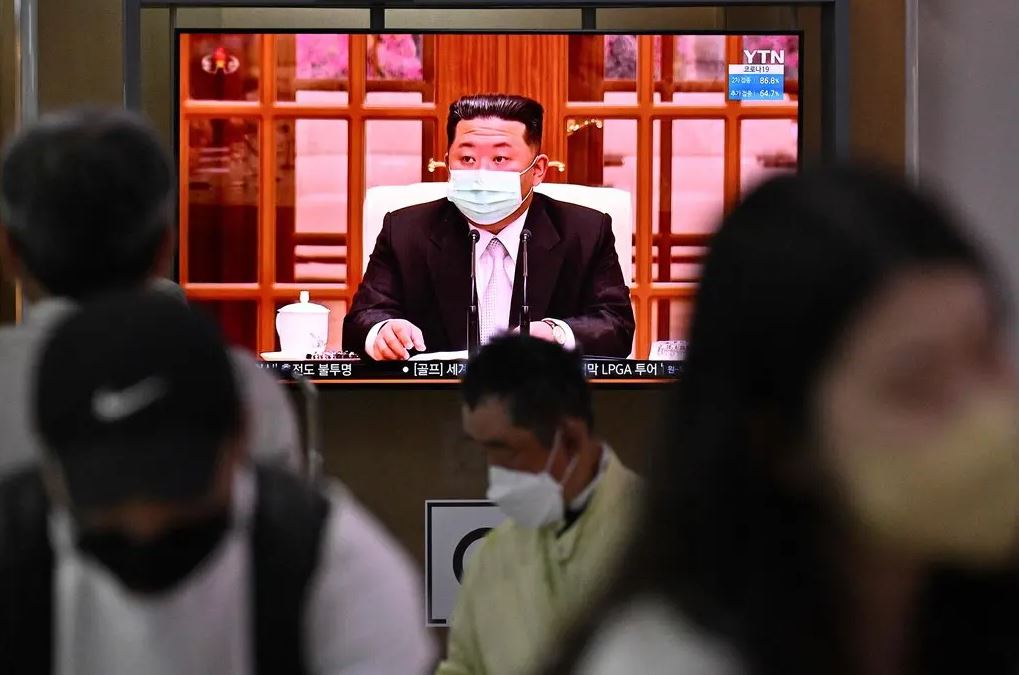The official media of North Korea announced on Friday that the coronavirus has been “explosively” spreading throughout the nation since the end of the previous month, resulting in the deaths of six individuals and the placement of 187,800 others under quarantine.
After maintaining for a considerable amount of time that it did not have any illnesses and rejecting outside humanitarian help to combat any potential spread, health authorities made the unusual acknowledgment of an impending public health disaster after the nation revealed its first incident of the virus. According to the official news outlet of the North Korean government, the Korean Central News Agency, the announcement of the deaths took place on Thursday when the leader of the country, Kim Jong-un, was touring the national disease-control headquarters.
The simultaneous spread of fever, with the capital as the hub of the outbreak, “shows that there is a weak spot in the epidemic prevention system,” Mr. Kim was quoted as saying by the North Korean news agency. Mr. Kim reprimanded his health professionals for their handling of the situation.
Some commentators have expressed concern that North Korea may be on the verge of a major humanitarian disaster if the international community is unable to convince the country to allow outside assistance in the battle against the virus.
According to Lee Sung-yoon, an expert on North Korea who teaches at the Fletcher School of Law and Diplomacy at Tufts University, “We are at the early stage of the spread of massive human agony.” It won’t be until much later that we will know the specific ailments, fatalities, levels of hunger, and numbers of those who starved to death.
After testing persons in Pyongyang, the capital of North Korea, who displayed signs such as a fever on Sunday, North Korea’s health authorities said that they had discovered the country’s first epidemic of the disease. According to the information, the BA.2 subvariant of the virus had infected these individuals.
The government of the nation of 25 million people declared a “maximum emergency” and issued orders for all towns and counties in the country to go into lockdown.
Since the end of April, the North Korean government reported that 350,000 individuals have been confirmed to have a fever, including 18,000 on Thursday alone. In addition, there were 162,200 persons who had made a full recovery. In the reports that have been released so far on the epidemic, it has been referred to as “a fever whose cause couldn’t be established.” They did not explain any of the details, such as the number of persons who tested positive for the virus despite having the fever. However, they reported that one of the six people who passed away had a positive test result for the BA.2 subvariant.
There have been no reports of North Korea accepting any gifts of Covid-19 vaccination from any international health groups as of yet. Officials in South Korea have expressed their optimism that the delivery of humanitarian aid, which may include vaccinations, may play a role in resuming diplomatic talks between North Korea and the United States and its allies.
Because the majority of North Koreans have not received any vaccinations against the COVID epidemic, the country is at a far higher risk than the majority of other countries. In addition, the outbreak could exacerbate the strain that has already been placed on the economy, which has been suffering for years as a result of sanctions imposed by the United Nations and North Korea’s decision, made two years ago, to close its border with China, its one and only major trading partner.
According to Lina Yoon, a senior Korea researcher for Human Rights Watch, “North Koreans are chronically hungry and unvaccinated. There are scarcely any medications left in the country, and the health system is incapable of dealing with this epidemic.” “The international community should give medication for Covid-19-related illnesses, anti-viral drugs that treat Covid-19, as well as vaccinations and all of the essential infrastructure for vaccine storage, including refrigerators, generators, and fuel,”
On Thursday, North Korea admitted that an incident had occurred, and then, a few hours later, it fired three ballistic missiles from the vicinity of Pyongyang toward the sea off of its east coast. This is the 16th missile launch conducted by North Korea in 2018.
The administration of South Korea, led by its newly elected president Yoon Suk-yeol, has denounced the test as a “grave danger” and a “provocation,” and it has accused the North of “duplicity” for testing weapons when its people were under peril from the coronavirus. However, it said that it would be ready to provide vaccinations, medicines, and other forms of humanitarian relief to the northern region.
White House press secretary Jen Psaki said in Washington that “the United States does not presently have plans to exchange vaccinations” with North Korea. This statement was made by Psaki. She said that the nation “continued to exploit its own population” via its policy of not accepting humanitarian help throughout the epidemic. She was referring to the policy of the government to not accept such aid.
Ms. Psaki stated, “Instead, they redirect resources to develop their illicit nuclear and ballistic missiles programmes,” which was a repetition of the judgement made by the United States government that North Korea may be ready to perform a nuclear test as soon as this month. The meeting between President Biden and Mr. Yoon is set to take place in Seoul on May 21.

